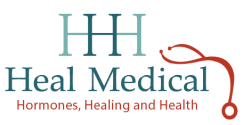The hormone wires are abuzz with the latest assessment of the Women’s Health Initiative, the 15 year study that ended in 2002, that frightened many women and physicians away from HRT. For those of us prescribing HRT, this is old news. For conservative groups supported by the pharmaceutical industry, this shift is a major change. While they don’t say, “well, maybe we might have been wrong, or exaggerated the risks of HRT”, they do admit that the data on closer inspection has some interesting findings. So while still somewhat confusing, here are the newest thoughts after further analysis of the WHI.
- Risk for Breast Cancer – Women in the WHI who took estrogen and progestin (not progesterone) had an increased risk for breast cancer with 2.6 breast cancer deaths per 10,000 women compared to women in the placebo group with 1.6 per 10,000 women. Women who took estrogen alone had a 63% lower risk of dying of breast cancer. Based on this data, most of us in the field believe that the culprit is the synthetic progestin.
- For hot flashes, mood swings, irritability, night sweats, heart palpitations, estrogen wins hands down against all other remedies. While lifestyle and some herbals and supplements may help, there is nothing that works as well as estrogen.
- Cardiovascular disease – 400,000 women a year die from heart disease making it the number one cause of death which is more than all cancers combined. This is where it gets a little tricky. For women age 50-59, HRT substantially decreases the risk for heart disease. Oral estrogen has a positive effect on lipid metabolism and is one of the few treatments for Lp(a) which is a significant risk factor for cardiovascular disease. However, HRT should be started early, i.e. within 10 years of menopause, because if a woman already has atherosclerosis, she is at risk for a CV event because the estrogen can precipitate plaque rupture in a woman with established disease. So, start HRT early, and don’t use oral estrogen in someone with risk factors such as hypertension or smoking. Be cautious when starting a woman on HRT that is greater than 10 years out from menopause.
- Stroke – thromboembolism – HRT can increase the risk for blood clots though these risk are reduced with topical or transdermal estrogen. Patients should be assessed for excess risk.
- Osteoporosis – Osteoporosis causes more morbidity and mortality than breast cancer. HRT is safe and effective though must be continued indefinitely to proffer protection.
- Diabetes – HRT may be associated with a decreased risk for Type II Diabetes. More research is needed.
- Colon cancer – In WHI, women had a reduced risk for colon cancer.
- All-cause mortality was lower in the women who took HRT.
- Overall quality of life was greater in the HRT group.
You should talk with a knowledgeable physician who can evaluate you and explain all the nuances of hormone replacement therapy. Just know that HRT is the best option for menopausal symptoms, the previously reiterated risks are exaggerated and taken out of context, and that after review of the WHI and other literature, experts are now acknowledging that the benefits of HRT are many and should not be denied to women.


Really pleased to see this.
Im a transsexual, living in NZ and like around the world, the initial WHI trial had repercutions here. All of a sudden, Docs threw up their arms and shouted warnings.
Alas it is still the case as they dont seem to have seen the reviews of the trial work done since.
Im no medically qualified person, just have a great specific interest in hormones for transsexuals.
Can you point me to where I may find some of the source material to support what you say please.
Alas Pharmaceutical companies do little if any trial work on MtF Transsexuals and cover thier butts by making no recomendations for us.
We tend to do our own ‘testing’ and make decisions based on the results we see from others.
But the medical profession we have to battle with continually as they are scared of a legal lawsuit and when fears of increased risks of cancers etc are yelled….. Cervical cancer, Ovarian cancer, Mammarian Cancer…
Hang on, I dont have a cervix or ovaries and little mammary tissue. So the risk to me is actually alot less anyway then with a natal female.
Much appreciate so pointers to source material on the recent reviews of the WHI thanks.
Racheal McGonigal
Racheal,
You have to arm yourself with knowledge and educate your physicians. If they won’t listen, find one who will. They are out there. I have written extensively about the hormones on my blog. A book by Neal Rouzier, “How to Achieve Healthy Aging” is a good reference to understand hormones, but he does not address transgender issues.. It is harder to find literature on hormones and transgender. I generally treat to “effectiveness”. I don’t know about long term effects but would agree that the risk for breast cancer is low. Courtney Ridley is a physician in TX that specializes in hormone therapy for transgendered women. Hope this is helpful.
What WHI showed was that horses hormones (Premarin) & substances made by Big Pharma (Progestin) were unsurprisingly (to me) unhealthy!!!
It showed/proved NOTHING about biodentical HRT!!!
I am on Bio HRT & will remain on them as long as I can find a Dr to rx & I can afford it. Life is intolerable & health at risk WITHOUT it in my humble experience & opinion.
Unfortunately the “latest WHI assessment” you mention above is just going to mean many Docs will rx those awful Big Pharma meds. No doubt it will improve their profits though.
Dear Lee,
I agree that Bio HRT is the way to go but my main goal is for women to understand that hormones are beneficial to their health and that this is supported by the medical literature. Because the medical community puts so much emphasis on the WHI, I think it is significant that even Premarin showed benefit, (but not Provera which should not be used in my opinion). There are studies in Europe supporting Bio HRT. Thanks for your comment and I would agree that Bio HRT is our best answer.